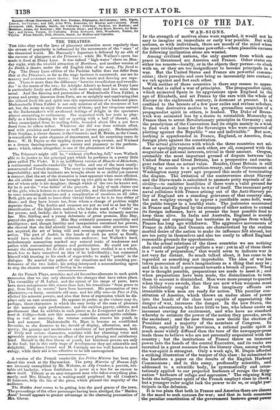THE THEATRES.
• THE tides obey not the laws of planetary attraction more regularly than the stream of popularity is influenced by the movements of the " stars " of the theatrical world. Mr. Macready's departure is followed by an ebb of the current of playgoers at the Princess's; while Mr. Wallace's opera has made it flood at Drury Lane. It was indeed "high-water" there on Mon- day night, with the twofold attraction of Maritana, and another version of Le Diable it Quatre under the old English title of its story, The Devil to Pay. The Drury Lane edition of the Parisian ballet does not differ from that at the Princess's, so far as the stage business is concerned; nor are its scenery and costumes more showy: but the music and dancing are supe- rior. There is more than the difference "betwixt tweedledum and tweedle- dee " in the music of the two; for Adolphe Adam's as heard at Drury Lane is particularly lively and effective, with more melody and less noise than usual. And the dancing and pantomime of Mademoiselle Flora Fabbri, a young and pretty danseuse from Paris, are so sprightly and captivating that she infused fresh life and spirit into this representation of a hackuied piece. Mademoiselle Flora Fabbri is not only mistress of all the resources of her art, but she seems to enjoy the exercise of them; and her vivacious naivete as the Basketmaker's wife awakened feelings of delight in the spectators almost amounting to enthusiasm. She coquetted with her train as play- fully as a kitten chasing its tail or sporting with a ball of thread; and, when emancipated from its trailing folds, bounded about like a pet fawn freed from its silken tether. Whatever she did was done without effort, and with precision and neatness as well as joyous gayety. Mademoiselle Petit Stephan, a clever dancer, is the Countess; and M. Bretin, as the Count, is remarkable for quiet elegance of deportment, and his surprising tours de force. W. H. Payne as the tippling tyrant and twig-twister, and Wieland as a demon dancing-master, gave variety and piquancy to the perform- ance; which, taken altogether, is one of the pleasantest of its kind.


























 Previous page
Previous page